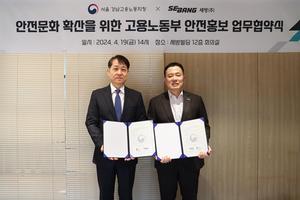 |
With the bloom of the technological advancement, a variety of mechanical devices has provided expeditious and convenient access to the many resources. Recent study reveals that the atmosphere is rapidly flowing toward the brand-new innovation known as AI/Big Data. The Artificial Intelligence, AI, is the integrated technology that empowers the computers and other connected machines to improve and evolve upon their own by updating data through human workforce. And Big Data, which is composed of high velocity, volume, and variety, enables society to analyze information and acquire the insight through a global network. Taken together, this interactive system is recognized to be a prospective contribution in assorted systems especially in a medical field.
 |
While countries all over the world recently showed the interest in medical AI/Big Data, five prestigious countries organized an official conference. On April 12, Korea Healthcare Congress opened the international meeting with healthcare specialists from Korea, US, UK, China, and Singapore at Seoul Dragon City in Yongsan. During this gathering, each healthcare specialists shared the conspicuous features in a theme of "Prospective Hospital within Arising Fourth Industrial Revolution." The representative from Singapore stated that "utilizing AI/Big Data has extraordinarily influenced the present medical system both at hospitals and at patient's home."
Along with the comment, the US healthcare specialist has announced that combined technology enabled to create a "software that automatically diagnoses the presence or absence of lung cancer by analyzing lung CT images". In a succession, healthcare specialists from each country proceeded into deeper discussion about how medical AI/Big Data enhances the diagnosis accuracy and plausible disease predictability while medical AI/Big Data reduces prevalence of a severe virus and cancer. Further, Hong Jeongyong, the President of Korean Hospital Association, proposed the successful project VUNO, a new AI-based medical solution which was lately completed and legitimately verified in 2018. The representative of VUNO, Lee Yea-ha, introduced "Korean Deep Learning based model", which he explained that "automatically predicts cardiac arrest and death risk by using four kinds of vital sign data such as blood pressure, heart rate, respiration rate and body temperature". Hong Jeongyong closed his statement by noting that "the next decade of the medical profession will undergo major changes that are unmatched by the past decade."
Korea Healthcare Congress is also attended by future medical leaders from around the world, including Tony Corkett, who leads Google DeepMind Health. Tony Corkett, the leader of Google DeepMind Health, pointed out that "healthcare sector is still ineffective because the flow of information is fragmented and complex", and he also added that "we are working with Google's 'streams' technology to provide the information to healthcare professionals in the US and UK hospitals."
It is now clear that AI/big data are already being utilized in many hospitals and other areas of healthcare and diagnostics. Despite of the weak point of ongoing AI/Big Data as Tony Corkett specified, opportunities offered now and in future by AI in the field of healthcare is expected to further thrive around the global eyes.
최신혁 강남포스트학생기자 gnpost@naver.com
<저작권자 © 강남포스트, 무단 전재 및 재배포 금지>

 고용노동부 강남지청-세방(주), 안전문화 확산 위한 업무협약 체결
고용노동부 강남지청-세방(주), 안전문화 확산 위한 업무협약 체결


